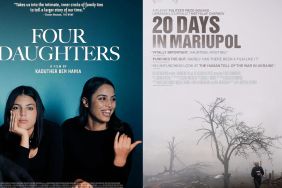Welcome back to the Oscar Warrior, where we look at the potential candidates for Hollywood’s most highly regarded movie awards. In Part 1, we examined the potential candidates for acting and directing nods, and now, we look at the most important race, as well as a few other categories that people like to pay attention to: screenplays, and the animated, documentary and foreign language features.
Best Achievement in a Motion Picture
This is the race that everyone’s been talking about, because this seems to be one of the more exciting years for Best Picture candidates and no one seems to be able to agree what constitutes that lovely word “best.”
A few barometers can be used to determine the best picture frontrunners, though critics and journalist groups are not the best, because at least in the case of the Broadcast Film Critics (BFCA) and Hollywood Foreign Press (HFPA), they each get to pick ten movies, giving them a better chance of nailing the five than local critics groups, who only announce their top picture. As far as the local critics groups, even top groups in the movie capitols of New York and L.A. aren’t perfect, and the last time both groups picked the same movie that went onto become the Best Picture winner at the Oscars was in 1993 with Steven Spielberg’s Schindler’s List. For the last two years, both groups have gone with the same movie as their top pick (Brokeback Mountain, Sideways), and in both cases, they won lots of the guild awards leading up to Oscars but didn’t get the Best Picture Oscar. In 2002, neither group’s choice was even nominated for Best Picture, but other than that, every year has seen at least one groups’ choice get into the Oscar Best Picture race. (L.A. has a slightly better track record, which should be expected, considering their proximity to Oscarland.)
Critics aside, one can also see a few correlations between the movies that get nominated for Best Picture among the candidates for the Producers Guild (PGA) and the Screen Actors Guild (SAG), both of whom announce their nominations on Friday, January 4. Then again, neither group is representative of the Academy as a whole, since they each have different criteria: the producers tend to nominate the big profit moneymakers while the actors tend to award the movies with the most impressive array of actors. Making up the largest branch of the Academy at 21%, the actorsmost of them in SAGwill already have the SAG Ensemble nominations to go by, which means movies with large casts of their friends have a good chance of getting mentions, though it’s good to know that the SAG Ensemble winner has only coincided with Best Picture 5 times in the last 12 years, being more of an indicator of an upset ala last year’s Crash.
Another thing to remember is that the entire Academy roster nominates for the top picture, and they use a rather unorthodox approach that starts with their 1st choices, then goes to 2nd choices, and very often, the members’ 4th and 5th choices are ignored. This is going to play a key part when looking at the candidates, as one has to consider which movies are the most popular in terms of people considering them the best of the year, and that’s not necessarily going to be the same movie that a critic might put at the top of their list.
The Favorite:
There’s been a lot of talk in recent months about whether the members of the Academy will be open to picking a musical featuring a predominantly African-American cast as their Best Picture, something that won’t come into play in the nomination process, but it’s just as likely to be a non-issue since it’s one of the few positive films with old-school sensibilities that the older Academy members can appreciate.
As mentioned by my esteemed colleague Tom O’Neil, the macho men of the Academy might have a problem with the movie’s nature, which would bring us to
The Competition:
The only other movie this year that’s likely to bring in more box office business and receive as many or more nominations than Dreamgirls is Martin Scorsese’s latest crime drama The Departed, based on the Hong Kong thriller Infernal Affairs. It offers something that few other Oscar movies can, which is lots of killing and swearing for the guys plus a cast of popular, hunky young actors for the ladies. If you look at the Best Picture winners over the last few years, you have more than a few male-driven movies from Unforgiven and Dances with Wolves to Braveheart and Gladiator. (Oddly, three of those four were directed by actors, a category oddly vacant this year.) It’s obvious that a lot of people like this movie from the amount of business it’s done in theatres, not to mention its overwhelming lead in critics’ year-end Top 10 list (well, it was in the lead when I wrote this anyway), and it also has a lot more wanton violence and swearing than some of Scorsese’s other films. It’s not a cheery film by any means. Alhough it’s not nearly as strong or memorable film as movies like Taxi Driver, Raging Bull or Goodfellas, all which lost at the Oscars, it’s likely to be Scorsese’s 6th film to receive a Best Picture nomination. The odd thing is that if The Departed does indeed win, the statue will be presented to Brad Pitt, who stars in another candidate, namely
The Others:
Babel is going into the season having the most Golden Globe nominations, which points to it winning the “Best Picture-Drama” race over The Departed and The Queen, though winning at the Globes rarely means anything for the Oscars, as seen the last few years. Alejandro González Iñárritu’s globe-spanning drama hasn’t done that great at the box office, nor does it have unanimous critical support as other movies, so it’s not likely to be a first choice on any Oscar voter’s ballot, despite having similar qualities as previous Oscar nominees like Traffic and last year’s Best Picture Crash. At one point, it was thought that this was a sure nomination but the buzz has died down a bit even as Paramount Vantage has kept the Oscar campaign going, including the mailing of thousands of DVD screeners, much like they did with Hustle & Flow last year. There’s a good chance that Academy members having easy access to the film will help it do well among the actors and technical branches.
Another popular movie this year is Stephen Frears’ The Queen, which is going into the Oscar race with an almost sure Oscar for Helen Mirren’s performance as the movie’s title character, and it has a better than good chance for screenplay and direction nominations. Some might feel that the subject matter is too British for the American members of the Academy, though one has to figure there’s a good number of ex-Pats in there considering how many British and Australian Oscar winners there’ve been over the years. The fact is that this is a strong character piece with historical and social significance, as well as being highly entertaining. Who knows? Maybe this is this year’s Shakespeare in Love?
The dark road comedy Little Miss Sunshine is a tough call, because it’s all about the ensemble cast and writing, which means it will get a SAG ensemble nod and an original screenplay nod, but because it has two directors (Jonathan Dayton/Valerie Faris), it probably won’t be nominated for its direction. Although it’s been a very popular movie, grossing over $50 million, it’s loved more by a younger, hipper audience than the Academy’s older voters, though it has a similar vibe to the 2004 nominee Sideways, which makes it more uplifting than other choices. The big difference is that Sideways had tons of critical support going into Oscar season where Little Miss Sunshine is all about Fox Searchlight’s intense marketing campaign, again with tons of screeners and other things sent to voters. Then again, with such a large and varied cast, it may be easier for the acting branch to just honor the film as a whole rather than individual actors.

The Longshots:
Paul Greengrass’ 9/11 drama United 93 has received a lot of critics’ nods–more than almost every other film–but it’s very much a critics’ film as seen by the number of positive reviews vs. the poor showing it received at the box office. Since the Academy’s tastes tend to be more towards the populist viewpoint i.e. what moviegoing audiences love, it’s going to be hard for this to get into the Best Picture race, especially considering how many members might be a bit antsy to watch it because of the subject matter. The fact that there are absolutely no name or face stars in the movie won’t help, though the job that Greengrass did in attempting to recreate the events is impressive enough that he should get a directing nod.
The other critically-acclaimed movie that stands little chance of getting into the Best Picture race, but has been getting more attention as the season rolls on is Todd Field’s Little Children, a dramatic character piece in the vein of American Beauty, which swept the Oscars back in 1999. It’s the second movie from Field, who cowrote and directed the five-time Oscar nominee In the Bedroom, but it’s more likely to get attention for its acting and writing than be considered anyone’s top movie of the year.
Three or four months ago, thinking that a genre-driven movie like Guillermo del Toro’s Pan’s Labyrinth would stand a chance in the Oscar race would be a fool’s folly, but considering how many people have been raving about it since its debut at the fall film festivals, one could easily see this being many Academy voters’ first choice. If by some chance, it does have enough support among voters picking it as their favorite, getting it into the BP race, it’s guaranteed to win in the Foreign Language category (see below).
My Personal Pick (s): Sure, Del Toro’s film is good, but for me, it always comes down to his Spanish-speaking peers Pedro Almodóvar and Alfonso Cuarón. Maybe it’s just that cute accent over the “o” in their names that requires a bit of extra work to type, but more than that, it’s because their latest movies, Volver and Children of Men, continue to show their development as top filmmakers, making fantastic films every bit as good or better than their American counterparts. Volver may be Pedro’s most accessible film and Children of Men is a highly-ambitious look at a hypothetical future, both of them either using classical filmmaking techniques (in the case of Volver) or daring new ones (Children of Men) that makes them two of the strongest and most original films of the year. Sadly, Cuarón’s film may be too odd and genre-based for Oscar voters, and Volver just has too much stronger competition.
The Story So Far:
BFCA: Babel, Blood Diamond, The Departed, Dreamgirls, Letters From Iwo Jima, Little Children, Little Miss Sunshine, Notes on a Scandal, The Queen, United 93
HFPA: Babel, Bobby, The Departed, Little Children, The Queen / Borat,The Devil Wears Prada, Dreamgirls, Little Miss Sunshine, Thank You for Smoking
SAG Ensemble (projected): Babel, The Departed, Dreamgirls, Little Miss Sunshine, The Queen and/or Little Children (Heck, they might even go with Bobby or Volver, those wacky actors!)
PGA (updated!): Babel, The Departed, Dreamgirls, The Queen, Little Miss Sunshine (It’s likely that their Golden Laurel will go to Martin Scorsese’s The Departed.)
It’s hard to determine the Best Picture nominees and winner just from the BFCA and HFPA nominations, since they each get ten choices. The omission of United 93 and Letters From Iwo Jima from the HFPA’s ten won’t necessarily rule them out, as they didn’t nominate Munich or Capote last year, though their lack of box office and cast of unknowns won’t help them among Hollywood actors and producers. With so many great ensemble casts and profitable films, one can expect that SAG and PGA may end up with 6 nominations each this year, but don’t expect them to go with the same choices for reasons mentioned above.
The Nominations: Babel, The Departed, Dreamgirls, Letters From Iwo Jima and The Queen (Updated: Now that Little Miss Sunshine has been nominated by the PGA, it’s even more likely to knock out Letters, rather than Babel.)
Best Writing in an Adapted Screenplay
This category can be tough to nail all five, because it’s picked by the Academy’s screenwriters and only they know what criteria is important for a quality screenplay. They certainly don’t seem to play favorites like the actors and directors, although you can expect that even screenwriters have peers whose work they appreciate and respect. These categories don’t always coincide with Best Picture, since there are ten choices as opposed to five, although for the most part, the adapted screenplay winner almost always coincides with one of the five Best Picture nominees, since they tend to have more adaptations than original works. Obviously, this category will often coincide with the choices of the Writers Guild of America, of which most if not all Academy screenwriters will also be members. The group tends to be more liberal than the Academy, maybe because it includes a lot of younger television writers, which explains why the script for American Splendor won over The Lord of the Rings: The Return of the Ring a few years back. (Oddly, the Academy would have seemed more likely to nominate Cold Mountain than the Writers’ Guild, but there ya go.)
The Favorite:

The Competition:
There really isn’t much in terms of competition, though two of the strongest dialogue-driven adapted screenplays of the year are Patrick Marber’s Notes on a Scandal and Todd Field and Tom Perrota’s Little Children, both character-driven films based on novels that rely heavily on their dialogue and the distinctive narrative voice-overs. Field was already nominated once for co-writing In the Bedroom, though this would be Marber’s first nomination after being snubbed for his screenplay for Closer. What’s interesting is that both of these films deal with tough subject matters like pedophilia, but the quality of the acting will certainly help both movies when it comes to the other Academy members voting on the choices.
The Others:
Bill Condon’s Dreamgirls is likely to get a Best Picture nomination, and since he’s been nominated for his screenplays for Chicago and Gods and Monsters, his name is already well known among the Academy screenwriters, though it’s not a given that the movie will get a nomination here if it’s thought that a lot of the dialogue is taken from the original musical. It’s more likely that Condon will be nominated by his fellow screenwriters than the directors, though.
Jason Reitman’s screenplay for the dark comedy Thank You for Smoking, based on the Christopher Buckley semi-fictional account of the tobacco industry, has many of the elements that appeal to the WGA’s darker side, though it might be a bit too cynical for the older Academy screenwriters.
On the other hand, Paul Haggis and William Broyles Jr.’s screenplay for Clint Eastwood’s WWII film Flag of Our Fathers, based on the non-fiction account of James Bradley and Ron Powers, is likely to touch all of the right things that appeal to Oscar screenplay voters, and there’s a very strong chance that the film’s screenplay is one of the few nominations it gets. Haggis won both the WGA and Oscars for last year’s Crash as well as being nominated for Eastwood’s last film Million Dollar Baby. A few people have been wondering whether Iris Yamashita’s screenplay for Eastwood’s other WWII film Letters From Iwo Jima should be considered as an adapted screenplay (since it was inspired by a book) or if it’s being considered enough of an original piece of work to get into that category. If it somehow gets nominated as adapted, then it will bump “Flags.”
The Longshots:

Likewise, Aline Mckenna’s adaptation of Lauren Weisberger’s best-selling novel The Devil Wears Prada spawned a huge hit at the box office, though that will mean little to the Academy and WGA screenwriters who may find it to be too cutesy for their predominantly male tastes.
My Personal Pick (s): I personally liked this year’s two turn-of-the-century magic films, which both were very smartly-written with their numerous twists, despite being very different beasts. Neil Burger’s adaptation of Steven Millhauser’s short story The Illusionist was very well-done as was Christopher and Nolan’s take on Christopher Priest’s The Prestige. It’s likely that one or both of these might be recognized by the Writers Guild, though they may be a bit too out-there for Oscar voters.
The Story So Far:
BFCA: Little Children and The Departed are the only adaptations.
HFPA: Little Children, The Departed and Notes on a Scandal received nominations.
WGA (projected): The Departed, Dreamgirls, Flags of Our Fathers and/or Letters From Iwo Jima (the WGA put Syriana here last year), Little Children, Thank You for Smoking (alts: The Devil Wears Prada)
Of course, we don’t know the WGA’s real picks yet, though their track record is running about 3 for 5 in coinciding with the Academy’s screenwriters picks. They tend to be a bit more liberal and more focused on American screenwriters, and not necessarily films that have made a lot of money. Thank You for Smoking is a great script, though it may be a bit too dark and nasty for the traditionalists in the Academy, but the WGA may pick it over Patrick Marber’s Notes on a Scandal.
The Nominations: The Departed, Dreamgirls, Flags of Our Fathers, Little Children, Notes on a Scandal (alternates: Thank You for Smoking or The Devil Wears Prada may be picked instead of Dreamgirls.)
Best Writing in an Original Screenplay:
This category has always been a great chance for the Academy to honor first-time screenwriters or visionaries like Charlie Kaufman or Pedro Almodóvar, and this year, there are more of the former than the latter.
The Favorite(s):

The Competition:
The only competition for Morgan to take the Oscar is likely to be Michael Arndt’s script for Little Miss Sunshine, the dark comedy picked up at the Sundance Film Festival by Fox Searchlight to become a huge hit. It’s a very strong script, brought to life by a great cast, and the movie has likely been seen by more people. It also has the quirky comedic nature that Oscar voters tend to love as seen by some of the past years’ winners.
The Others:
Another new screenwriter with her first produced screenplay looking for a nomination is Iris Yamashita’s script for Clint Eastwood’s Letters From Iwo Jima, which is almost guaranteed to receive an Oscar nomination in one of the two categories, even if it looks to be this year’s Syriana, where no one knows in which category it should be considered.
In the last few years, Guillermo Arriaga has become one of Mexico’s finest writers, and yet, he has yet to be nominated for an Oscar or a WGA nod. Granted, the latter might be due to the guild’s odd quirk about foreign screenwriters, but this screenplay for frequent collaborator Alejandro González Iñárritu’s Babel has already received a Golden Globe nod, and it’s likely that it will be hard for the Academy to ignore him this year.
The only writer in this category who has already been nominated and won an Oscar for writing is Spain’s Pedro Almodóvar, who pulled a surprise win in 2003 with Talk to Her, though a lot of that might have been in response to Spain not submitting his movie as their foreign language choice that year. Almodóvar’s latest film Volver has a very strong, quirky script that’s even more accessible, though it’s far more common for the Academy to honor a foreign language film in this category than the WGA.
The Longshots:

Eric Roth won an Oscar in 1995 for the Tom Hanks Oscar winner Forrest Gump and his screenplay for Robert De Niro’s The Good Shepherd is a pretty ambitious and complex examination of the CIA. The movie itself is rather long and dull, and one can’t imagine the screenplay being that much more exciting, but the Academy nominated his last script for Steven Spielberg’s Munich, while the WGA passed it over for Syriana in this same category. Again longshot.
A lot of what makes The Pursuit of Happyness so special is the performance by Will Smith and his son Jaden, but there’s also something to be said about Steve Conrad’s original screenplay based on the real-life travails of Chris Gardner and his son. It’s not likely that the Academy or Writers Guild will notice how much the script contributes to Smith’s performance.
My Personal Pick: One of my favorite movies of the year was Will Ferrell’s Stranger Than Fiction, mainly due to the amazing script by first-time screenwriter Zach Helm, which harked back to the works of Charlie Kaufman and P. T. Anderson, two quirky screenwriters who have been noticeably absent in the last few years. This is a great debut for Helm, pointing to a long career and future Oscar nominations in the cards, though it’s possible, this one falls under the radar of Oscar voters compared to the movies that have other nominations.
The Story So Far:
BFCA: Babel, Little Miss Sunshine, The Queen, Stranger Than Fiction
HFPA: Babel, The Queen
WGA (projected): Babel, Borat, Letters from Iwo Jima, Little Miss Sunshine, Stranger Than Fiction (alt: The Queen, The Good Shepherd)
Again, the WGA tends to be more open to unconventional fare, and they’re unlikely to nominate foreign writers over Americans, as seen by Mike Leigh’s omission for Topsy-Turvy and Vera Drake. Pedro Almodóvar has never been nominated by the WGA either, despite winning an Oscar in 2003, and Babel screenwriter Guillermo Arriaga may also have been snubbed due to the WGA’s apparent xenophobia. Either way, the WGA is likely to honor Borat with a nomination much like they did Judd Apatow’s The 40-Year-Old Virgin last year, though it will be hard to convince the snobbier Oscar writers to agree.
The Nominations: Babel, Letters From Iwo Jima, Little Miss Sunshine, The Queen, Volver (The Queen should win this with Little Miss Sunshine being the spoiler.)
Foreign Language Film
It’s rarely easy to predict how the Academy’s special committee decides on which five foreign language films to pick out of the 61 submissions that are eligible, although there are a number of countries with a pretty decent track record with the committee and Oscar voters.

Mexico has picked the rather unconventional choice of Guillermo del Toro’s dark fantasy Pan’s Labyrinth, which is only strange due to Del Toro’s notable genre roots. The movie’s a co-production with Spain, who probably are hoping that Almodóvar will bring the country its 5th Oscar with his latest film Volver. Almodóvar’s film is getting a lot of critical acclaim, but not nearly as much as “Pan’s,” which has received 8 critics’ awards compared to Volver‘s 2. Then again, Volver is more traditional, reuniting the master with Penelópe Cruz, one of the stars of All About My Mother, his previous Oscar win in this category. Since Cruz is likely to get an acting nomination for the film, it does raise its awareness above Mexico’s selection. It’s also good to know that to date, Spain has received 19 nominations with 4 wins including the previous one for Almodóvar.
Two years ago, Zhang Yimou’s historic epic House of the Flying Daggers was shunned by the Academy, but his latest movie Curse of the Golden Flower, reunites him with Gong Li, who starred in two of his earlier Oscar nominees, Ju Dou and Raise the Red Lantern. The movie’s also more in the vein of Hero, which received a foreign language nod in 2002, but this is such a crowded year for foreign films, and Mr. Zhang’s latest isn’t getting nearly the raves of his earlier work.
Italy holds the record for the most nominations and wins for a single country, and their latest entry, Emanuele Crialese’s The Golden Door about a Sicilian family coming to America won two prestigious awards at the Venice Film Festival. Of course, that might not mean anything since it is an Italian film festival, but it points to a strong emotional drama like the kind the Academy loves.
After winning the Oscar with Denys Arcand’s The Barbarian Invasion in 2003, Canada has gone an unconventional route with their selection of Deepa Mehta’s India-based Water, the third in her series of four movies which ran into problems while filming in India, until her native country came to her aid.

While the good money would be on the Almodóvar, his previous Oscar wins might convince the Academy to go for someone new, so it’s likely to come down to a battle between the traditional, which would be Florian Henckel von Donnersmarck’s The Lives of Others, to the highly unconventional, which is Guillermo del Toro’s fantastical Pan’s Labyrinth. As a fan of Blade 2 and Hellboy, you can guess who I’m rooting for.
The Nominations: Black Book, The Lives of Others, Pan’s Labyrinth, Volver, Water (alts: The Golden Door, Days of Glory, Curse of the Golden Flower)
Since this is already getting a bit long, we’ll keep the next two sections brief:
Documentary Feature
There was a time when no one had seen half the documentaries eligible for the Oscar, but in ’06, there were more docs than ever and the final selections, selected by a special committee of presumably liberal doc filmmakers who watch all of them, will come down to politics.

Amy Berg’s Deliver Us From Evil offers the only real competition for the Gore doc, being about Father Oliver O’Grady, a Catholic priest who molested dozens of kids during the ’70s and ’80s while being protected by the Catholic Church. It’s probably one of the most shocking and disturbing films since Capturing the Friedmans, though that lost in the 2003 race to the political doc The Fog of War.
There are a number of strong docs about the current situation in Iraq, but it’s likely that the Academy would go with something like Iraq in Fragments, which tells the story from the Iraqi point of view, than the more one-sided viewpoint of the soldiers’ stories told in The Ground Truth or The War Tapes.
Equally shocking to Deliver Us from Evil is Heidi Ewing and Rachel Grady’s Jesus Camp, their in-depth look at the evangelical training of young kids at a special retreat. It’s not the strongest doc of the year technically, but it’s pretty shocking considering the footage and interviews they get with evangelical Christians supporting the right wing viewpoints of the country’s government.
The Weinstein Company is likely to give a big push to Shut Up & Sing, a doc which mixes music and politics, as it examines the Dixie Chicks’ hard road back after being knocked off their pedestal by an off-the-cuff remark about the President.
Because the doc category always includes one or two films that no one has seen or heard of yet, there could be a few surprises like the frontrunner favorite An Inconvenient Truth losing to something more obscure, though it’s probably not very likely.
Animated Feature
Because this was one of the most crowded for animated films ever, particularly the computer-created kind, this year will probably have five nominations in this category, but it’s likely to come down to a tussle between two family films.

Since there have to be three other nominations, expect at least one or both of DreamWorks’ films, Over the Hedge and Flushed Away, to get in, with Sony’s Monster House filling out the roster. There’s a slight chance that something like Richard Linklater’s Rotoscoped adaptation of the Philip K. Dick novel A Scanner Darkly or the European crime-drama Renaissance might sneak in, though neither is nearly as viewer-friendly as the more traditional computer-animated films.
The Academy of Motion Pictures Arts and Sciences announce their nominations on January 23 at 5:30 AM Pacific with the award show being held on February 25. (Bookmark this article for an update after guilds announce their nominations this week and next.) If you’re interested in reading more thoughts on the Oscar race, please check out sites like Oscarwatch, Gold Derby, MovieCityNews, and InContention.com, who spend most of the year obsessing over Oscars.









